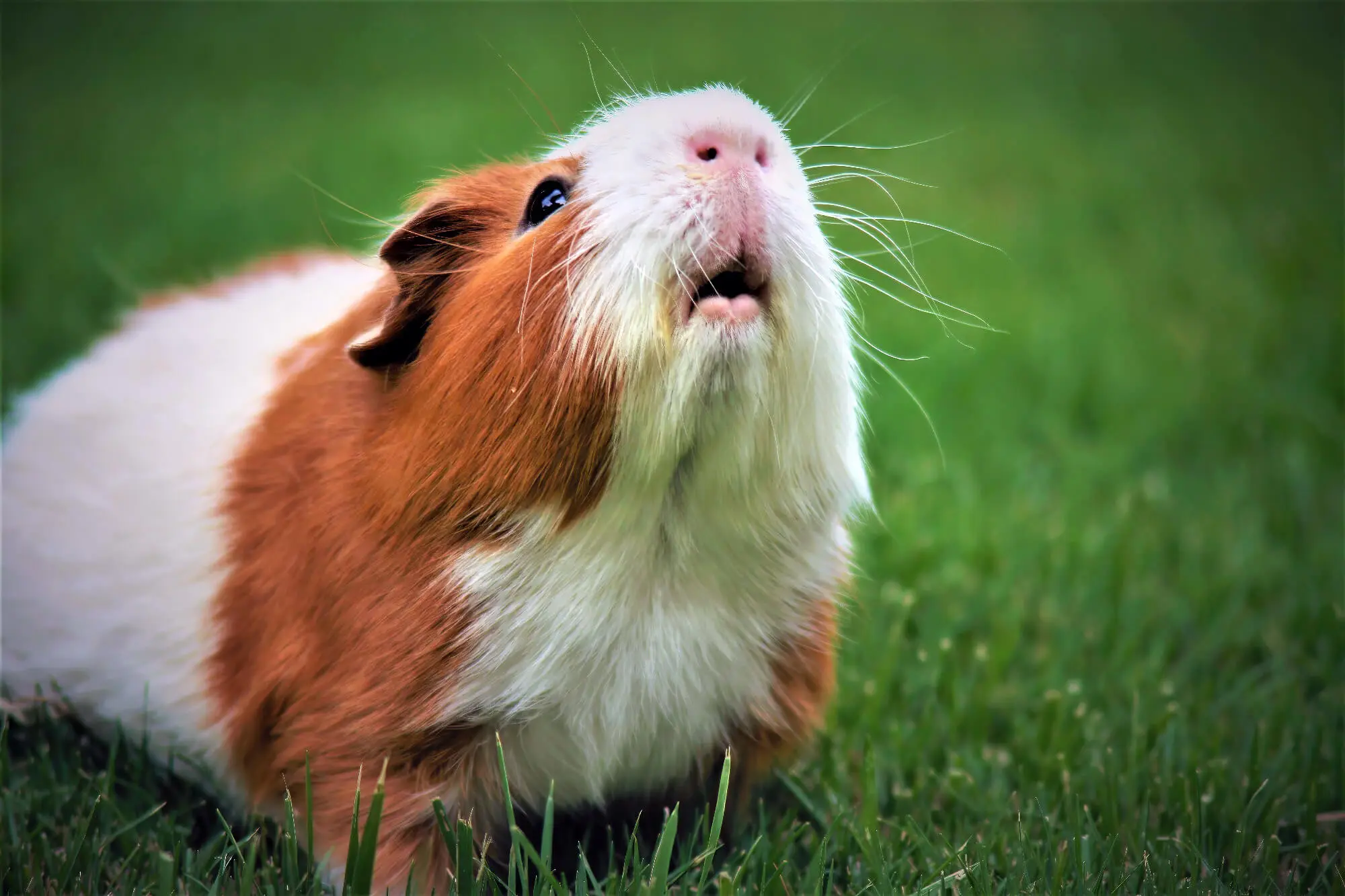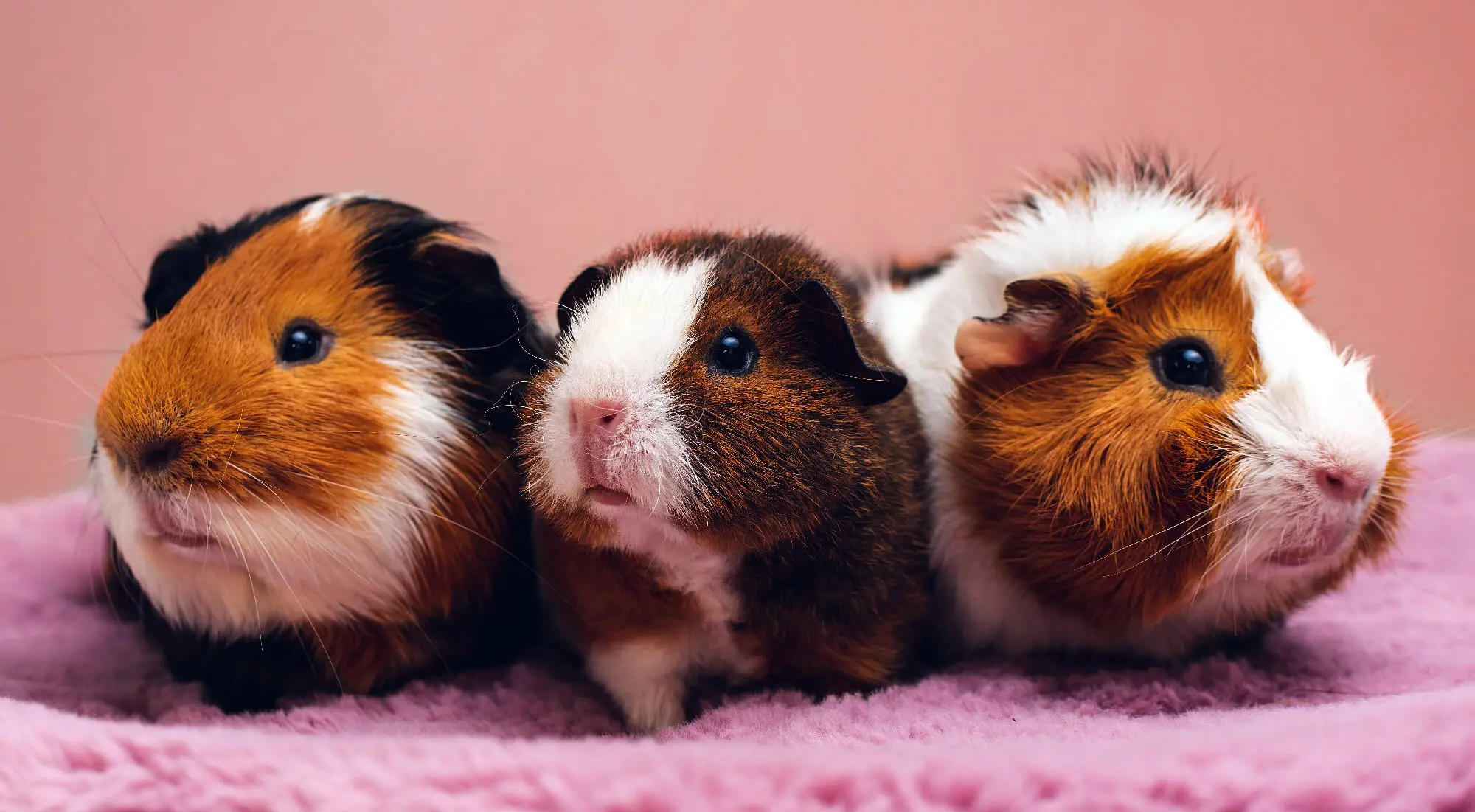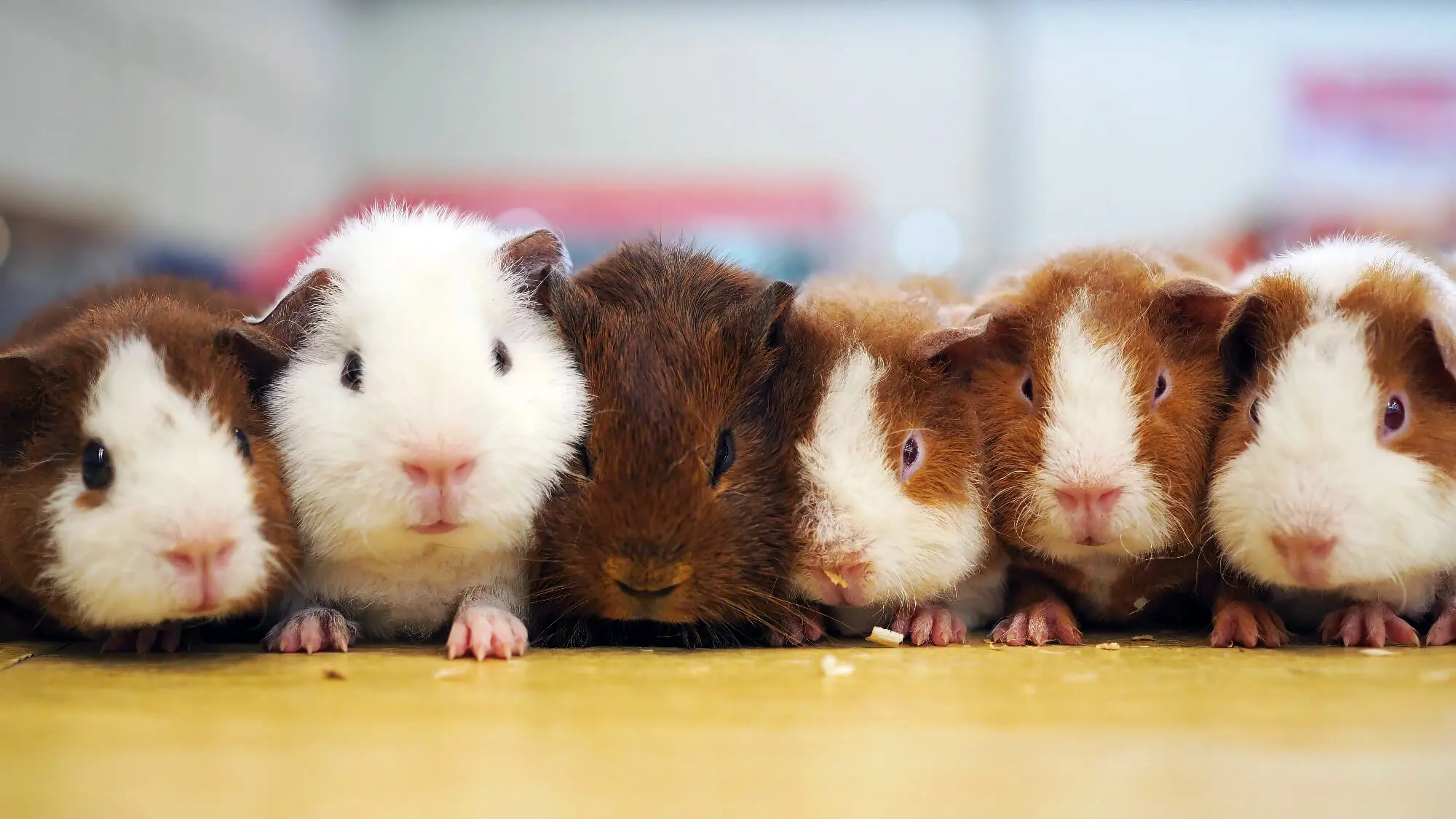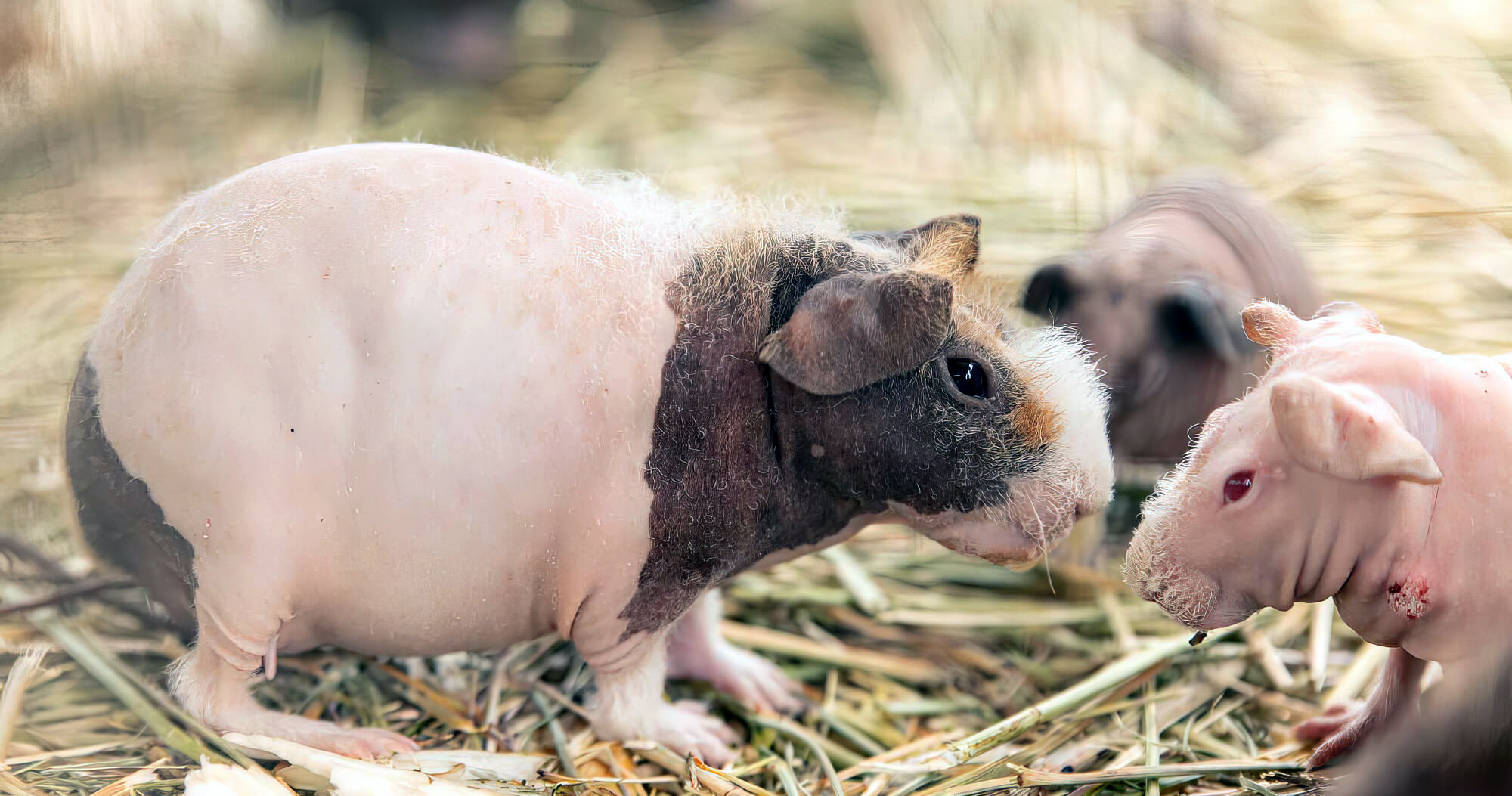A guinea pig can be a great option if you’re looking for a small mammal as a pet.
Neither do they occupy much space, nor do they have much maintenance needs. However, you must know if guinea pigs can cause allergies. And in the following sections, we will answer just that!
Are Guinea Pigs Hypoallergenic?

It may disappoint you, but guinea pigs are NOT hypoallergenic animals. Warm-blooded animals with fur, hair, or feathers can cause allergic reactions in human beings, and guinea pigs are no different.
You may have heard that some ‘special’ guinea pig breeds with no hair or fur may be hypoallergenic, but there are no hypoallergenic guinea pigs.
However, the good news is that you don’t have to worry about allergic reactions unless you’re sensitive or prone to developing allergies.
Besides, people with allergies can become proud guinea pig owners. And in the following sections, we will tell you how!
What Causes Guinea Pig Allergies?

Before telling you more about guinea pig allergies and what you can do to counter them, let’s understand what causes these allergies in the first place.
As mentioned, a guinea pig’s fur or hair can affect allergy sufferers. But what about a hairless guinea pig, then? Guinea pig allergies are caused by a specific protein found in their hair (dander), fur, saliva and urine. And once it comes in direct contact with humans, the protein triggers the release of chemicals like histamine, which can cause symptoms like:
- Runny nose
- Watery eyes
- Itching
It’s essential to remember that guinea pig allergies aren’t life-threatening per se, but the symptoms can cause severe discomfort in humans. You may even require medical intervention to relieve them. That’s why it’s crucial to determine if you’re allergic to guinea pigs before getting one, and there are a few ways to do that.
How To Know If You’re Allergic To Guinea Pigs?
Firstly, we’d suggest spending adequate time (a couple of hours) with a guinea pig if your friend or family member has one. If you don’t show any signs of allergies mentioned above, you probably aren’t allergic to them. Better still, try to be around the animal for a few days to be completely sure.
Alternatively, you can visit a pet store to be around these small mammals and look for any signs of allergies. If you’re severely allergic to them, you may develop the symptoms quickly and experience extreme discomfort.

So, the best way to find out if you have a guinea pig allergy is to see a doctor to get an allergy test done in a controlled environment. The test includes placing a small quantity of guinea pig dander on your skin and then pricking it to allow it to get inside the bloodstream.
If you’re non-allergic, you won’t feel anything after the test. But if you are, you may develop itchiness, swelling and redness almost immediately. And in case it gets severe, you will have immediate medical aid.
What Are The Other Allergy Symptoms You May Suffer?

Since furry guinea pigs are the most common type of pet, their dander is the top allergen for many. In case you inhale the dander, you may experience sneezing. Aside from that, coughing and wheezing are some other symptoms that can occur. Likewise, getting dander into your eyes may cause them to become red, itchy and runny.
However, a severe allergic reaction can cause an anaphylactic shock, which causes the throat to swell up to the point where you may experience extreme difficulty in breathing. This can be life-threatening and requires immediate attention (generally in the form of an epi-pen). As for other symptoms, getting medical aid can quickly resolve the issues.
One thing we should mention here is that guinea pigs can carry strains of ringworm and respiratory infections. And you may get infected by them upon contacting your pet’s infected skin, saliva or feces.
As a result, you may develop the following symptoms:
- Rashes
- Blisters filled with pus
- Sneezing
- Coughing
- Runny nose
- Vomiting
- Fever
- Diarrhea
Some of these symptoms may be confused for allergies, so keep an eye on your pet to see if it appears sick. If it does, it’s an infection that has also affected you.
Types Of Guinea Pig Allergies
The allergic reactions caused by guinea pigs can be divided into respiratory and contact dermatitis. Coughing, sneezing and wheezing are all respiratory allergies, including sudden anaphylaxis or a drop in blood sugar.
However, contact dermatitis occurs when your skin comes in contact with the allergy-causing protein found in guinea pigs. In such a case, your skin may quickly become red and develop hives or blisters, but these usually resolve on their own within a couple of days.
Managing Guinea Pig Allergies: Tips And Tricks
With all said and done, it’s time to address the elephant in the room- how to manage your guinea pig pet allergies? The simplest answer to this will be to keep your guinea pig and its surroundings clean so that you can limit exposure to its dander or urine. And here are a few ways to do that:
1. Designate A Separate Space
One of the easiest things you can do is to keep your pet away from your bedroom, living room, office space, or any other frequently visited area. Consider keeping it in a separate area, like the laundry room, provided it has the right environment for the pet.
2. Clean Its Cage
Cage cleaning regularly is essential to eliminate fur or dander accumulating on the surface. Use a vacuum cleaner for this, and don’t forget to wear gloves and a dust mask to reduce exposure to pet dander.
3. Bathe And Groom Your Guinea Pig
Bathing your guinea pig with mild soap and water can be a good way to reduce shedding and, consequently, dander present in the air or on other surfaces. But ensure you don’t allow the soap or water to enter your pet’s eyes or nose.
Moreover, regular grooming to remove excess fur or dander can help.

4. Cleaning The Bedding
Guinea pig bedding almost always consists of wooden shavings, which can ‘capture’ fur and trigger allergic reactions. So, limiting the number of wood shavings in the cage and replacing them regularly can reduce allergens present on the surface.
You can also use hypoallergenic bedding like fleece bedding, paper bedding or straw, which reduces the chance of allergies.
5. Take Care Of Feeding Time And Droppings
Some pet owners may also be allergic to guinea pig food (grass or hay). Besides, the dander or saliva contaminating the food can cause allergies. So, it may be better to feed them wearing gloves so your skin doesn’t come in contact with the food.
Further, special hypoallergenic grass or hay varieties are available, which don’t compromise the nutrition of the guinea pigs. We’d also recommend preparing litter boxes for your guinea pigs to urinate, which can be disposed of without releasing allergens into the air.
If you have other pets, especially cats and dogs, they, too, can develop guinea pig allergies, so it may be better to keep them away. And speak to a vet to learn about the best ways to prevent and manage allergies in them.
Can You Still Keep Guinea Pigs If You Have Allergies?
With the tips and tricks mentioned above, you may find it easier to house guinea pigs. As additional steps, you can consider installing air purifiers to reduce the amount of dander in the air. Or, get an air purifier for the room where you keep the guinea pig cage.

Some people may also be advised to get allergy shots or injections containing small amounts of guinea pig dander into the skin. This will help your immune system develop resistance to the allergens over time, reducing allergy symptoms or even making you symptom-free!
Hypoallergenic Guinea Pig Breeds
Nothing is known as ‘hypoallergenic pets,’ as you may develop allergies from practically any animal or bird. However, some species may reduce the chances of developing allergies or severe symptoms concerning guinea pigs.
For instance, the American Shorthair is one such species you can consider, as it has short and smooth dander with less shedding. Similarly, the Peruvian breed produces less dander than other breeds, thereby limiting the amount of allergens.
But they will still have the allergy-inducing protein in their droppings and saliva, so make sure you take adequate precautions to deal with them.
So, Is Guinea Pigs Hypoallergenic?
If you want to pet small animals, guinea pigs, despite their allergy-inducing ‘properties,’ can be a good choice- all you need to do is take the necessary precaution.
And when it comes to quality food, cages, or toys for them, Pet Planet can be your one-stop solution. We facilitate fast deliveries nationwide at affordable rates, so contact us today!






